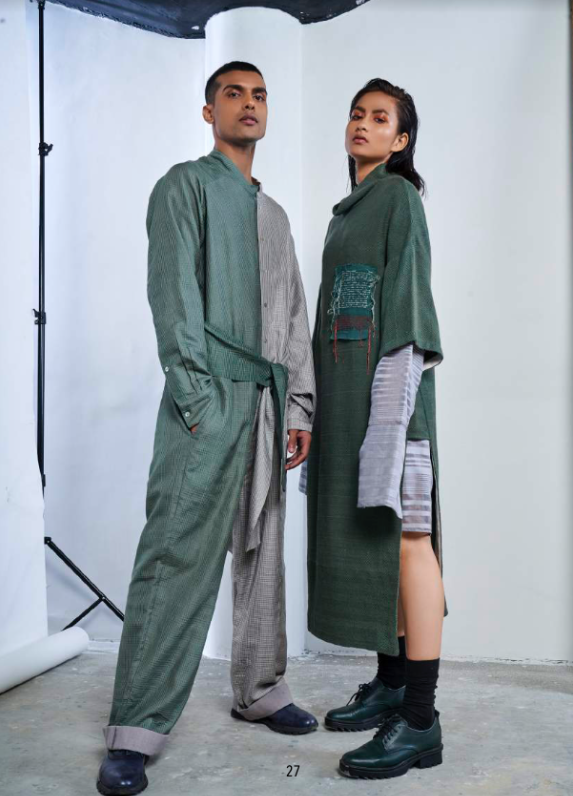


The world of fashion is often characterised as an avenue for selfexpression. Whether it is the hottest looks fresh from the runway or the vintage skirt your mother used to wear during her college days, fashion and design have many faces. The last few years saw a significant boom in the industry for easily accessible and comparatively more affordable and fashionable clothes. ‘Fast fashion’ was characterised by two major factors: Low cost, efficient mass production. Often emulating the latest trends, fast fashion presented itself as an affordable way for consumers of all walks of life to indulge themselves in the latest looks without burning a hole in their pockets.
However, fierce competition in the field often compels retailers to quickly release new designs and looks for their stores. This constant rush in production often results in a bloat of clothes that have proven to be an environmental hazard over the last few years. While affordable fashion might seem to be a viable alternative for consumers from all walks of life, it is also responsible for massive waste generation. According to a report by the Ellen McArthur Foundation, the fashion industry also utilises and eliminates wastewater and its dependence on heavy production also contributes to emission of global gas emissions.
To counter these adverse effects propelled by an industry, massive awareness campaigns and efforts have been made to educate consumers and urge them to make informed and environmentally conscious choices. Fast fashion was countered by the advent of the ‘slow fashion’ movement, which considers the processes and resources required to make clothes with a particular focus on sustainability. Coined by Kate Fletcher of the Centre for Sustainable Fashion, it followed the popular ‘slow food’ trend and focused on a need for slowing the pace of the fashion industry. Slow fashion encourages consumers to buy less, with a focus on quality over quantity, highlighting the art of making clothes and celebrating the craftsmanship behind designing and producing a garment.

In the context of India, the slow and sustainable fashion approach is one that is also deeply rooted in history and tradition. Handloom and woven fabric are an important part of the traditional crafts and textiles of our country, with each region having unique indigenous weaving and cloth production practices. A carefully woven handloom or silk sari is a precious staple in every Indian wardrobe. Similarly, the act of handing down clothes or valuables is an essential part of our familial traditions. Some of the most cherished items in our closets sometimes happen to be a precious sari or two from our grandmothers and mothers. Thus, when we take into account the various facets of tradition and practice within our cultures regarding pre-owned clothing, we can see that there already exists a deep-rooted practice around the idea of utilisation and sustainability.

The advent of Covid-19 saw an unprecedented limbo in the fashion industry faced with an uncertain future due to the lockdown and lack of mobility of production. Proponents of ethical fashion amongst Indian design houses proclaimed their support and insistence on a labour intensive approach to fashion, according to an article by Jaydeep Ghosh. The article details the responses of various Indian designers and labels as they faced the crisis induced by the countrywide lockdown. Most of the designers including Tarun Tahiliani, Pankaj and Nidhi, and Rahul Mishra, to name a few, doubled down on the need to support and expand their use of artisans, weavers and embroiderers in creating their clothes. The irreplaceable role of the craftsperson in an atelier highlights one of the main aspects of ethical, sustainable clothing. The emphasis on ‘slowing down’ the process of creation and focusing instead on the quality of its production is ensured through an atelier’s use of skilled embroiders and artists.
Some characteristics of an ethical and sustainable fashion brand is their use of high quality, sustainable materials, along with few, specific styles per collection and a focus on locally sourced and produced garments. This is crucial in eliminating the exploitative chain of factory line production that fuels the mass production of clothes by fast fashion brands. Ethical brands ensure that the environment is taken care of by eliminating the main factors that contribute to waste and pollution, such as mass production of multiple styles while also contributing in supporting dwindling indigenous crafts industries. Due to the overwhelming intrusion of fashion at our fingertips, local practices of production have taken a blow. Age-old practice of producing textile, weaving and embroidery are dying as families who had been engaged in the practice for generations move from their craft to seek employment elsewhere due to economic constraints. A sustainable approach to fashion also ensures local sourcing of cloth, material, artisans and production, which helps support dwindling indigenous practices.
Integrating woven and embroidered fabric in modern couture is one of main aspects of ethical fashion brands in India today. This turn to the sustainable and an increasing interest in ethical fashion is a result of increased consumer awareness around the issue as well as our peculiar cultural context, where slow, locally produced clothes play an important role in our cultural legacy and heritage. Although brands with a focused approach to sustainability are still new to the Indian apparel market, they have garnered robust attention and support from fashion lovers who wish to remain in vogue without damaging our planet’s delicate ecosystem further. With its unique vision rooted in traditional practices and looking towards a sustainable future, Indian brands have furthered the cause of sustainability in their conscious approach to the art of ethical fashion.
Shalini Passi is the founder of The Shalini Passi Art Foundation and MASH. She is an art, design and fashion patron, philanthropist, artist and an avid art collector.
Copy edited by: Ambika Hiranandani